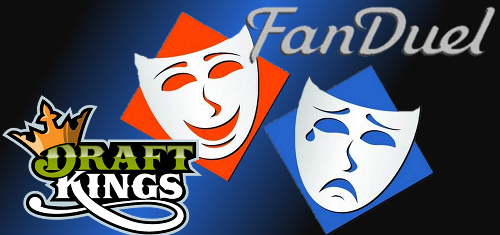 Another day brings another deluge of developments in the never-ending soap opera that is daily fantasy sports.
Another day brings another deluge of developments in the never-ending soap opera that is daily fantasy sports.
New York Attorney General Eric Schneiderman, who declared this week that DFS was illegal gambling, now says he was forced to send a cease and desist letter to DFS operators DraftKings and FanDuel because the “dysfunctional” federal government is “falling apart.”
On Thursday, Schneiderman told Politco that states were tired of waiting for the feds to amend the Unlawful Internet Gambling Enforcement Act (UIGEA) to eliminate its carveout of fantasy sports, or at least this exemption’s applicability to DFS, which Schneiderman called a “quick-payout, high-pressure” version of fantasy that didn’t exist when the UIGEA was passed in 2006.
Regardless, Schneiderman said there was “no exemption” for DFS under New York’s gambling laws, although he’s sure that the “phalanx of lawyers” employed by DraftKings and FanDuel were furiously lobbying state legislators to revise the law in order to get DFS on the list of acceptable gambling activities.
Schneiderman’s timing coincided with the inaugural Daily Fantasy Sports Players Conference, which kicked off Thursday in New York. Friday will see DFS supporters hold a rally held outside Schneiderman’s Manhattan office in order to demonstrate their displeasure in more dramatic fashion than simply tweeting ‘u suck’ at the AG.
PAYMENT PROCESSORS INCREASINGLY ANTSY
Wednesday saw payment processor Vantiv tell DraftKings and FanDuel to halt transactions with New York players in response to Schneiderman’s C&D order, which gave the companies five days to comply. On Thursday, Marketwatch solicited comments from other financial firms, all of whom said they were reviewing the situation with their attorneys.
The UIGEA may have exempted fantasy sports from the list of gambling transactions that financial firms are required to block but the UIGEA defers to individual states as to how they choose to enforce its edicts within their borders.
Michael Zeldin, a former anti-money laundering official at the US Department of Justice, wondered why any major financial firm – many of which are based in New York – would take a chance of pissing off regulators when “the fines these days will outstrip any benefits of staying on board.”
THE CASE FOR THE DEFENSE
On Wednesday’s conference call with reporters, FanDuel’s legal counsel cited the 2007 case of Humphrey v. Viacom as a key plank of their plan to fight Schneiderman’s action. NorthJersey.com’s John Brennan recently recapped that fight, in which an individual named Charles Humphrey Jr. attempted to sue several mainstream media sites for promoting pay-for-play season-long fantasy contests.
Humphrey sued the operators using what’s known as ‘qui tam’ gambling loss-recovery laws, which allow third parties to sue illegal gambling operators to recoup other gamblers’ losses, provided those gamblers fail to make their own claims within a six-month window.
Similar suits have been brought against online poker companies in recent years by private citizens but also by the Commonwealth of Kentucky, which convinced Bwin.party to pay $15m in 2013 to cover losses incurred by Kentucky residents on PartyGaming prior to the site’s 2006 exit from the US market.
In the Humphrey case, Judge Dennis Cavanugh dismissed the plaintiff’s claim based on his inability to identify any individual who’d lost money with the sites, how much they’d allegedly lost or when these losses might have occurred. In other words, well thought out, twinkles.
But Cavanugh also ruled against Humphrey’s claim that fantasy sports registration fees constituted wagers, saying such fees were “not wagering, betting or staking money” if they are “paid unconditionally for the privilege of participating in a contest, and the prize is for an amount certain that is guaranteed to be won by one of the contestants.”
Cavanugh went on to say that “when the entry fees and prizes are unconditional and guaranteed, the element of risk necessary to constitute betting or wagering is missing.” More to the point, Cavanugh said legal precedent had established that this distinction could be made “without deciding whether the outcome of the game is determined by skill or chance.”
CANADA GAMING ASSOCIATION SAYS DFS IS ILLEGAL
The legality of DFS is also being questioned north of the 49th parallel. On Thursday, TSN (basically, ESPN for toque-wearers) reported that the Canadian Gaming Association (CGA) had prepared a report for the federal government which declared DFS to be illegal under Canada’s Criminal Code.
The CGA, which supports amending the Code to allow provincial gaming monpolies to offer real-money single-game sports betting, says it commissioned a legal opinion on the DFS issue from Don Bourgeois, former general counsel for the Alcohol and Gaming Commission of Ontario. CGA spokesman Paul Burns said it would share Bourgeois’ report with provincial attorneys general – and possibly local police – in the coming days.
Bourgeois told TSN that the Code considers any game “of mixed skill and chance” to be a game of chance and thus meeting the definition of gambling. DFS companies maintain that DFS is a game of skill, a contention Bourgeois found disingenuous. “I looked at it. Is it a game of skill? No, not for purposes of the Criminal Code.”
In July, the National Hockey League took an investment stake in DraftKings, which also has a partnership with Maple Leaf Sports and Entertainment, the owners of the Toronto Maple Leafs, Toronto Raptors and Toronto FC. Bourgeois expressed skepticism as to whether the relevant boards of governors had done proper due diligence, while wondering how the companies would recoup their investment should DFS be declared illegal on either side of the border.
